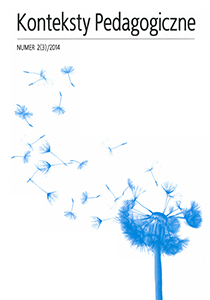Abstract
Problems in behaviour disorders are important as the scale of difficult behaviours in children is ever expanding. Behavioral disorders are the result of emotional disorders and lead to social maladjustment. The problems of adaptation may be twofold: they can either appear in the form of aggressive behavior or, in the form of withdrawn behavior. McKinney points out that adjustment is not an opposite of maladjustment, because one can adjust yet in the wrong way.
References
Aronson E., Wilson T.D., Akert R.M., Psychologia społeczna. Serce i umysł, przeł. Brzezwińska et al., Poznań 1997.
Biała M., Problemy z zachowaniem dzieci i młodzieży,Warszawa 2008.
Czajkowska I., Herda K., Zajęcia korekcyjno-kompensacyjne w szkole, Warszawa 1989.
Hillenbrand C., Pedagogika zaburzeń w zachowaniu, przeł. E. Cieślik,Gdańsk 2007.
Konopnicki J., Niedostosowanie społeczne,Warszawa 1971.
Lipkowski O., Dziecko społecznie niedostosowane i jego resocjalizacja,Warszawa 1971.
Mikrut A., Agresja młodzieży z niepełnosprawnością intelektualną – uwarunkowania i przejawy, Kraków 2005.
Mikrut A., Zaburzenia w zachowaniu młodzieży z lekką niepełnosprawnością intelek-tualną – przejawy i uwarunkowania,[w:] K. Ćwirynkało, Wychowanie w edukacji specjalnej osób z lekką niepełnosprawnością intelektualną, Toruń 2011.
Mikrut A., Olszewski S., Zachowania agresywne a lęk u osób upośledzonych umysłowo w stopniu lekkim i ich pełnosprawnych intelektualnie rówieśników,[w:] B. Urban,Problemy współczesnej patologii społecznej,Kraków 1998.
Namysłowska I., Psychiatria dzieci i młodzieży,Warszawa 2004.
Olszewski S., Postrzeganie przestrzeni życiowej przez młodzież z niepełnosprawnością in-telektualną w kontekście zachowań agresywnych,Kraków 2005.
Pecyna M., Rodzinne uwarunkowania zachowania dziecka, Warszawa 1998.
Podgórecki A., Patologia życia społecznego, Warszawa 1969.
Siemaszko A., Granice tolerancji, o teoriach zachowań dewiacyjnych,Warszawa 1993.
Stawicka M., PolaszewskaNicke M., Jakość przywiązania w etiologii zachowań agre-sywnych,[w:] B. Gulla, M. PleczykWysocka, Przestępczość nieletnich, Kraków 2009.
Stelmach J., Rodzinne uwarunkowania przestępczości nieletnich,[w:] B. Urban, Społeczne konteksty zaburzeń w zachowaniu,Kraków 2001.
Urban B., Osobowościowe i społeczne predykatory zachowań przestępczych,[w:] B. Urban, Dewiacje wśród młodzieży – uwarunkowania i profilaktyka,Kraków 2001.
Urban B., Zaburzenia w zachowaniu i przestępczość młodzieży, Kraków 2000.
Urban B., Osobowe i społeczne predykatory zachowań przestępczych,[w:] B. Urban, De-wiacje wśród młodzieży – uwarunkowania i profilaktyka,Kraków 2000.
Wolińska J.M., Agresywność młodzieży. Problem indywidualny i społeczny,Lublin 2000.
Wójcik D., Środowisko rodzinne a poziom agresywności młodzieży przestępczej i nieprze-stępczej,Wrocław, Warszawa, Kraków, Gdańsk 1977.
Wrótniak U., Refleksje nad rozwojem społecznym dziecka niepełnosprawnego intelektual-nie w kontekście przygotowania go do roli ucznia, „Chowanna” 2004 , nr 22.
Wysocka E., Diagnoza w resocjalizacji. Obszary problemowe i modele rozwiązań w ujęciu psychopedagogicznym,Warszawa 2008, 2009.
Żywanowska A., Agresja u osób z lekką niepełnosprawnością intelektualną. Wielowymia-rowość uwarunkowań, Kraków 2009.
In accordance with the recommendation of the Ministry of Science and Higher Education, which aims to counteract the practice of “ghostwriting” and “guest authorship,” all authors submitting their text for publication should attach an author’s statement which declares the contribution of each of the authors to the article. The printed and signed statement should be delivered by mail or other means to editor-in-chief Joanna Skibska or sent in the form of a scan to the following e-mail address: redakcja@kontekstypedagogczne.pl. The authors will not receive remuneration for publishing their papers. The editors reserve the right to make minor editorial changes to the articles which will not affect the substance of the article. We encourage all authors to prepare their articles in accordance with the guidelines for manuscript preparation. Download pdf file.
Authors transfer all copyrights and grant the journal the right of first publication with the work simultaneously licensed under a Creative Commons Attribution License that allows others to share the work with acknowledgement of the work's authorship and initial publication in this journal. All authors agree to the publishing of their email addresses, affiliations and short bio statements with their articles during the submission process.

